Introduction
Best prime and best zoom lenses mounted on 700D
Canon has divided its range of EOS models intro three distinct groups, ranging from the pro models, such as the EOS-1Dx and 5D Mk III, through to the those targeting ‘enthusiasts’, which includes the EOS7D and then the models aimed at ‘beginners’. While the EOS 700D sits at the top of this later group, there are four other models beneath it, and of those, three use an 18-Mpix sensor with similar performance characteristics. The EOS 60D and semi-pro EOS 7D also use a similar sensor. They’re not identical, the EOS 7D adopts a stronger, or more aggressive LPOF (Low Pass Optical Filter) limiting sharpness somewhat when compared to the EOS 700D.
DxOMark database overview
In total, we’ve looked at 130 different lens models with a (full frame equivalent) focal length ranging from 16mm to 960mm including primes and zoom lenses designed to cover both full frame (24x36mm) sensors and the physically smaller APS-C imaging chip. Some of the made for digital (APS-C) lenses tested include:
- The wider angle is the Sigma 10-20mm f/3.5 EX DC HSM (equivalent to 16-32mm)
- Tokina AT-X 11-16 f/2.8 AT-X PRO DX Canon (equivalent to 18-27mm)
- Tamron SP 17-50mm f/2.8 Di-II VC (equivalent to 26-78mm)
- Canon EF-S 18-135mmm f/3.5-5.6 IS STM (equivalent to 29-215mm)
- Canon EF-S 55-250mm f/4-5.6 IS II (equivalent to 90-400mm)
- Canon EF-S 60mm f/2.8 Macro USM (equivalent to 100mm, Canon’s only EF-S prime)
Although the APS-C cameras from Canon have their own range of lenses (designated EF-S), it wouldn’t be unusual to think that some of these users own or have access to Canon full-frame lenses and would be interested to know how their full-frame models perform on a ‘cropped’ camera.
One lens that is equally appealing to both full-frame and APS-C users is Canon’s latest 35mm. On the EOS 700D, the EF35mm f/2.0 IS USM is the equivalent of a 55mm f/2.0 and the built-in image stabilization is useful for not only stills but for hand-held video as well!
This is just one example of how certain focal lengths can be chosen for their versatility across both formats. The following is a list of lenses we’ve tested that are particularly suited to serving double duty on a full-frame body:
- Canon EF 24mm f/2.8 IS USM (equivalent to a 40mm f/2.8)
- Sigma 35mm F1.4 DG HSM A (equivalent to a 55mm f/1.4)
- Canon EF 35mm f/2.0 IS USM (equivalent to a 55mm f/2.0)
- Tamron SP 90mm F/2.8 Di MACRO 1:1 VC USD Canon (equivalent to a 144mm f/2.8)
- Canon EF 100mm f/2.8 Macro USM (equivalent to 160mm f/2.8 Macro)
- Canon EF 135mm f/2.0L USM (equivalent to 200mm f/2.0)
- Canon EF 70-200mm f/2.8L IS USM (equivalent to (115-320mm f/2.8)
APS-C cameras are also chosen to complement full-frame telephoto lenses where the 1.6x multiplier of the smaller sensor makes these lenses even more attractive for sports and action photographers:
- Canon EF 300mm f/4L IS USM (equivalent to 480mm f/4)
- Canon EF 300mm f/2.8L IS USM
- Canon EF 400mm f/2.8L IS USM (equivalent to 640mm f/2.8)
Primes – The best single focal length lens for your Canon EOS 700D / APS-C camera
 |
 |
 |
| Sigma 85mm F1.4 EX DG HSM Canon | 969 | 24 |
| Canon EF 35mm f/2 IS USM | 850 | 23 |
| Sigma 35mm F1.4 DG HSM A Canon | 899 | 23 |
| Canon EF 85mm F1.2L USM | 1599 | 22 |
| Carl Zeiss Distagon T 35mm f/1.4 ZE Canon | 1843 | 22 |
| Canon EF 85mm f/1.2L II USM | 1869 | 21 |
| Canon EF 100mm f/2 USM | 440 | 21 |
| Canon EF 35mm f/1.4L USM | 1420 | 21 |
| Samyang 85mm f/1.4 Aspherique IF Canon | 285 | 20 |
| Samyang 35mm F1.4 AS UMC Canon | 599 | 20 |
| Sigma 30mm F1.4 DC HSM A Canon | 499 | 20 |
| Canon EF 400mm f/2.8L IS II USM | 10499 | 20 |
| Canon EF 300mm f/2.8L IS II USM | 6599 | 20 |
| Canon EF 24mm f/1.4L II USM | 1550 | 20 |
| Sigma 50mm F1.4 EX DG HSM Canon | 499 | 20 |
| Canon EF 50mm f/1.4 USM | 385 | 20 |
| Carl Zeiss Makro-Planar T 50mm f/2 ZE Canon | 1280 | 20 |
| Canon EF 24mm f/2.8 IS USM | 800 | 19 |
| Canon EF 135mm f/2L USM | 1070 | 19 |
| Carl Zeiss Distagon T 25mm f/2 ZE Canon | 1700 | 19 |
If we refer back to the review of the Canon EOS 5D Mk III and the ten best performing primes, it’s interesting (but not really surprising) to note that apart from the Sigma 85mm f/1.4 that sits at the top still, the ranking isn’t the quite same for the APS-C Canon EOS 700D.
Interestingly, the EF 35mm f/2.0 IS USM, EF 35mm f/1.4L, Zeiss 35mm f/1.4, the highly regarded EF 85mm f/1.2L II USM and the two Samyang lenses have all moved up the ranking.
Apart from the shuffling in the positions, the same models appear in the list. Most of Canon’s primes of moderate focal length such as Canon EF 100mm f/2 USM and EF 50mm f/1.4 USM do well, as do those with similar focal lengths from third-party makers. In fact, and only four points separates the 20 models.
Zoom: the best zoom lenses for the APS-C Canon EOS 700D
In our testing of zoom lenses, it came as little surprise to see the new Canon EF 24-70 f/2.8L II USM take the top spot. It’s pretty much considered as the benchmark professional grade standard-zoom. No real surprises there, or that the new VC Tamron 24-70mm f/2.8 would follow closely either. However, both the new Tamron SP 70-200mm f/2.8 and the Sigma 50-150mm f/2.8 EX DC APO OS HSM come in ahead of Canon’s prestigious pro-level $2,499 EF 70-200mm f/2.8L IS USM by two-points in our DxOMark scores. That particular model was only recently upgraded and features 23 elements in total (with one fluorite and no less than five UD glass elements).
Canon EOS 700D vs 7D: same sensor but slight difference on the AA filter.
 |
 |
 |
| Canon EF 35mm f/2 IS USM | 14 | 11 |
| Sigma 35mm F1.4 DG HSM A Canon | 14 | 12 |
| Canon EF-S 18-135mm F3.5-5.6 IS STM | 9 | 7 |
| Canon EF-S 55-250mm f/4-5.6 IS II | 7 | 6 |
The EOS 700D and EOS 7D essentially share the same sensor, though there are slight differences between them resulting in improved Sharpness scores, though this is somewhat lens dependant. The EOS 700D has a lower strength OLPF that will, for the most part, allow the sensor to capture more detail but may lead to some aliasing with the sharpest lenses.
Please look out for Part 2 – Best wide angle and telephoto and super zoom, and Part 3 – Best kit lens, standard zoom and standard prime of this series, where we’ll look at the results for the EOS 700D and lens combinations in more detail.
For this review we’ve amassed the data on a number of ‘standard’ lenses made for both APS-C (with a smaller imaging circle) and full frame models that serve double duty on both formats. The lenses that make up this group are arguably the most versatile of their type, and are likely to be your first choice when buying a new camera. They also offer some of the highest imaging performance of any of the groups – the more extreme the focal length, the more difficult it is to correct the anomalies (or aberrations) that are inevitable in lens design.
Standard focal length on a Canon EOS 700D
1- Specification and type of use
For the EOS 700D we’ve measured and evaluated 35 different standard and moderate telephoto lenses from 40mm through to 135mm full-frame (24x36mm) format. A 35mm full-frame lens on a Canon APS-C format body, for example, has a similar angle of view to a 56mm.
We’ve not yet had a copy to review of the new Art series Sigma 18-35mm f/1.8 DC HSM, an intriguing model for its high-speed constant aperture and promise of high IQ. There are bound to be other lenses, new and old, that are in the scope of this overview but please leave comments below, and we’ll try add the popular models to our database.
For clarity, we’ve organized the 35 lenses that we have seen into their respective groups:
- Normal primes between 40mm and 50mm (8 models)
- Primes of focal length from 70mm to 135mm (16 lenses)
- Standard Zoom (11 lenses)
2- Best lens kit for EOS 700D?
 |
 |
 |
| Canon EF-S 18-55mm f/3.5-5.6 IS STM | 250 | 13 |
| Canon EF-S 18-135mmm F3.5-5.6 IS STM | 549 | 12 |
If bought as a kit, the main two lenses supplied with the EOS 700D are the EF-S 18-55mm f/3.5-5.6 IS STM (28-90mm equivalent) and EF-S 18-135mm f/3.5-5.6 IS STM (equivalent to 28-215mm on a full-frame camera).
Both these STM and IS equipped lenses are close in optical performance, the shorter focal range 18-55mm performing just ahead overall of the 18-135mm. The former has less distortion and is the sharper of the two over the focal range even though both score an averaged 9P-Mpix for Sharpness. Overall, the lenses are well specified for their targeted audience but there are better performers available.
3- Standard or normal lenses: get the best “every day” prime
 |
 |
 |
| Canon EF 35mm f/2 IS USM | 850 | 23 |
| Sigma 35mm F1.4 DG HSM A Canon | 899 | 23 |
| Carl Zeiss Distagon T 35mm f/1.4 ZE Canon | 1843 | 22 |
| Canon EF 35mm f/1.4L USM | 1420 | 21 |
| Samyang 35mm F1.4 AS UMC Canon | 599 | 20 |
| Sigma 30mm F1.4 DC HSM A Canon | 499 | 20 |
| Carl Zeiss Distagon T 25mm f/2 ZE Canon | 1700 | 19 |
| Carl Zeiss Distagon T 35mm f/2 ZE Canon | 1030 | 19 |
| Canon EF 28mm f/2.8 IS USM | 699 | 18 |
| Sigma 30mm F1.4 EX DC HSM Canon | 440 | 17 |
| Sigma 28mm F1.8 EX DG ASP Macro Canon | 449 | 17 |
| Tokina AT-X M35 PRO DX AF 35mm f/2.8 Macro Canon | 599 | 17 |
| Canon EF 35mm f/2 | 400 | 17 |
| Carl Zeiss Distagon T 28mm f/2 ZE Canon | 1280 | 17 |
| Canon EF 28mm f/1.8 USM | 470 | 16 |
With DxOMark scores of 23 points, the top slot is occupied by two lenses:
- the new Canon EF 35mm f/2 IS USM
- the high-speed Sigma 35mm f/1.4 DG HSM A.
Narrowly missing the coveted no 1 spot is the manual focus Carl Zeiss 35mm f/1.4 ZE, and in third place sits Canon’s own high-speed L-series offering the EF 35mm f/1.4L USM.
For the value choice, look no further than the new Sigma 30mm f/1.4 DC HSM A. Unlike the slightly better performing Samyang it has autofocus (with a built-in ultrasonic type motor), and good imaging performance (except for the wider aperture f/1.4) for $500.
4- Short telephotos: select the best lens for portrait
 |
 |
 |
| Sigma 85mm F1.4 EX DG HSM Canon | 969 | 24 |
| Canon EF 85mm F1.2L USM | 1599 | 22 |
| Canon EF 85mm f/1.2L II USM | 1869 | 21 |
| Samyang 85mm f/1.4 Aspherique IF Canon | 285 | 20 |
| Sigma 50mm F1.4 EX DG HSM Canon | 499 | 20 |
| Canon EF 50mm f/1.4 USM | 385 | 20 |
| Carl Zeiss Makro-Planar T 50mm f/2 ZE Canon | 1280 | 20 |
| Carl Zeiss Planar T 85mm f/1.4 ZE Canon | 1280 | 19 |
| Canon EF 50mm f/1.8 II | 99 | 18 |
| Sigma 70mm F2.8 EX DG Macro Canon | 499 | 18 |
| Canon EF 50mm f/1.2L USM | 1574 | 18 |
| Canon EF 85mm f/1.8 USM | 379 | 18 |
| Canon EF-S 60mm f/2.8 Macro USM | 390 | 18 |
| Carl Zeiss Planar T 50mm f/1.4 ZE Canon | 725 | 17 |
| Tamron SP AF 60mm F/2 Di II LD [IF] MACRO Canon | 499 | 13 |
Canon is well represented in the top 10 best (equivalent) short telephoto lenses, but the independent manufacturer, Sigma, occupies the top slot. In fact, achieving 24 points the full-frame Sigma 85mm f/1.4 EX DG HSM has the highest DxOMark Score of all 130 lenses tested.
In second place with a DxOMark score of 22 Canon’s original EF 85mm f/1.2L USM, followed very closely by the current mark II version with 21 points.
Newcomer Samyang lies in fourth place but at $285 for a high-speed (large aperture) 85mm, it’s easy to forgive the lack of AF, stopped down metering and zero lens-oriented EXIF data. One point to note is that these 85mm lenses have an equivalent angle of view to that of 135-140mm lenses, which are fine for outdoor portraits but not so good when moving indoors. That’s the time to switch to 50mm – on the EOS 700D they’re the equivalent to 80mm.
5- Standard Zoom
Inevitably, some blurring of the categories occurs with Standard zooms made for full-frame and APS-C and is the reason for the wide range of lenses available. It doesn’t come as any surprise to see Canon’s highly regarded EF24-70mm f/2.8L II USM lens sitting at the top nor is it a shock to see the new Tamron occupying the runner-up position.
However, after the Sigma 17-70mm f/2.8-4 DC Macro OS HSM, which is a solid performer for $499, it’s largely anyone’s game. Most of what follows are lenses covering the APS-C format but the Tokina AT-X 16-28mm f/2.8 Pro FX and Canon EF 16-35mm f/2.8L II USM lenses are in fact full-frame ultra-wide angle models, and would be good choices if you’re already own (or are also considering) a full-frame body.
Please look out for Part 3, the final installment of this series – Best wide angle and telephoto and super zoom, for the Canon EOS 700D.
In the latest of our lens reviews based on Canon’s EOS 700D and its 18-mpix APS-C sensor we’ve assessed a wide range of both APS-C and full frame models from Canon and third-party lens makers Some of the more extreme lenses in this group are quite specialist and can be relatively pricey, however if you’re beginner there’s still a wide choice of models available, especially in the ‘super-zoom category’.
DxOMark selection:
1.1 Best high ratio zooms (Super Zooms) for the Canon EOS 700D
Lenses offering a wide zoom range typically more than 5x (and frequently x10 and higher) the minimum focal length are often referred to as ‘super-zooms’. For the beginner, the versatility of a lens like an 18-250mm (28-400mm equivalent in 35mm terms) is hard to beat and there are models for all budgets, including professional-level optics aimed at seasoned travel pros using full-frame (35mm format) cameras. Canon’s EF28-300mm f3.5-5.6L IS USM is one such model, but there are plenty of accessibly priced and more appropriate options for the EOS 700D and similar APS-C sensor size DSLRs .
In fact, the best performing super-zoom for the EOS 700D is one designed specifically for the APS-C format sensor.
Although the image quality is close between the top performing models, with a DxOMark score of 12 points the new stabilized and stepper motor equipped EF-S 18-135mm f/3.5-5.6 IS STM (28-215mm equivalent) takes the number one position. With just one point less, the similarly stabilized EF-S 18-135mm f/3.5-5.6 IS comes a very close second, albeit tied to the optically more ambitious full-frame (and very pricey), pro-grade EF28-300mm f/3.5-5.6L IS USM.
All three offer a high zoom ratio, stabilization and a relatively ‘bright’ maximum aperture at the wider end and make a good choice. Bear in mind the full-frame model is the equivalent to a 45-480mm on the EOS 700D and a lot larger and heavier than the other two.
Perhaps the best overall value choice though is the Sigma 18-200mm f/3.5-6.3 II DC OS HSM. Not only does it feature a ultrasonic type motor and stabilization it has a higher-zoom ratio than the two top performing models and is priced at a not unreasonable $399.
1.2 Best Short-telephoto Zooms (70-200mm) for the Canon EOS 700D
On an APS-C camera, such as the EOS 700D, the 70-200mm (112-320mm equivalent) models offer mostly higher image quality than the super zooms and as full-frame lenses can serve double duty on the EOS 5D and EOS 6D models (though their ranking does alter slightly on 35mm FF bodies). Tamron does well here, taking the top position with their new stabilized $1699 70-200mm f/2.8 and the value choice with the older $770 model. Another option is the Sigma 50-150mm f/2.8 APO EX DC OS HSM (see below). That model is stabilized and has an ultrasonic AF motor like the new Tamron and falls between the two on price at $999.
1.3 Best telephoto primes for the Canon EOS 700D
 |
 |
 |
| Canon EF 100mm f/2 USM | 440 | 21 |
| Canon EF 400mm f/2.8L IS II USM | 10499 | 20 |
| Canon EF 300mm f/2.8L IS II USM | 6599 | 20 |
| Canon EF 135mm f/2L USM | 1070 | 19 |
| Carl Zeiss Makro-Planar T 100mm f/2 ZE Canon | 1840 | 19 |
| Canon EF 200mm f/2.8L II USM | 800 | 18 |
| Canon EF 600mm F/4L IS II USM | 11999 | 17 |
| Canon EF 300mm f/2.8L IS USM | 6000 | 17 |
| Sigma 105mm F2.8 EX DG Macro Canon | 640 | 17 |
| Canon EF 100mm f/2.8L Macro IS USM | 969 | 17 |
| Canon EF 500mm F/4L IS II USM | 9499 | 16 |
| Sigma 105mm F2.8 EX DG OS HSM Canon | 969 | 16 |
| Canon EF 100mm f/2.8 Macro USM | 536 | 16 |
| Sigma 150mm F2.8 EX DG OS HSM APO Macro Canon | 1099 | 15 |
| Canon EF 135mm f/2.8 Soft Focus | 870 | 14 |
| Canon EF 180mm f/3.5L Macro USM | 1500 | 14 |
| Canon EF 300mm f/4L IS USM | 1269 | 11 |
| Tamron SP AF180mm F/3.5 Di LD (IF) MACRO 1:1 Canon | 690 | 10 |
All of the telephoto lenses are full-frame models but they’re still suitable for APS-C format cameras like the EOS 700D and in most situations, the smaller sensor (with its 1.6x crop factor) is a benefit. The highest scoring lens on the EOS 700D is the EF 100mm f/2 USM, however, as a lens intended for portraits (and equivalent to a 160mm on a APS-C format body) this is one model where the smaller sensor size may be a disadvantage. For longer focal lengths, Canon’s telephoto lenses are all very high performing optics.
It’s not a simple case to pick telephoto lenses on value. However, Canon’s 300mm f/4L IS USM has stabilization, fast AF using an ultrasonic motor, and good imaging performance when compared with zooms of comparable focal length.
Note: the Canon EF 400mm f5.6L is not measured yet, it’s known as a good performer for the price
1.4 Best Telephoto Zooms for the Canon EOS 700D
With a DxOMark score of 19 points, the best performing telephoto zoom on the EOS 700D is the designed for APS-C format Sigma 50-150mm mm f/2.8 EX DC APO OS HSM. It’s still pricey at $999 but good value compared with similarly specified full-frame 70-200mm models. After that particular model though, image quality drops significantly, though the Canon EF 70-300mm f/3.5-4.5L IS USM and Sigma equivalent are still strong performers optically. If longer focal lengths are required, though lacking versatility, fixed focal length primes may be the better option.
1.5 Best Wide Angle Primes (full frame models) for the Canon EOS 700D
 |
 |
 |
| Canon EF 24mm f/1.4L II USM | 1550 | 20 |
| Canon EF 24mm f/2.8 IS USM | 800 | 19 |
| Carl Zeiss Distagon T* 2.8/15 ZE Canon | 2950 | 16 |
| Canon EF 24mm f/2.8 | 356 | 16 |
| Carl Zeiss Distagon T 21mm f/2.8 ZE Canon | 1730 | 15 |
| Samyang 14mm f/2.8 IF ED UMC Aspherical Canon | 379 | 14 |
| Canon EF 14mm f/2.8L II USM | 2249 | 13 |
| Canon EF 20mm f/2.8 USM | 514 | 13 |
| Carl Zeiss Distagon T 18mm f/3.5 ZE Canon | 1395 | 12 |
One of the shortcomings of the smaller sensor is that are few purpose-designed wide-angle prime lenses available. In fact, Canon doesn’t make any, and third-party lens makers have yet to take up the challenge, each preferring to offer full-frame models or zooms instead (see below). Although the Canon EF 24mm f/1.4L II USM is the best performing lens in this category, the firm’s newer stabilized EF 24 f/2.8 IS USM (equivalent to a 38mm) is likely a better match for the EOS 700D (unless price is not an issue).
1.6 Best Wide Angle Zooms for the Canon EOS 700D
As you might expect, there is a good choice of zooms covering shorter focal lengths for APS-C format DSLRs, however if brand loyalty is an issue choosing the Canon EF-S 10-22mm f/3.5-4.5 USM over others may not be a wise decision as it can be bettered optically by cheaper third-party models.
Tied at first place with a DxOMark Score of 14 points is the Tokina AT-X 116 PRO DX, a mid-price AF 11-16mm f/2.8 (18-26mm equivalent) model (note we’ve not yet tested the newer Mk II version). Tokina also take our value choice with the AT-X 124 PRO DX. Although a ‘slower’ AF 12-24mm f/4 (19-38mm equivalent) model, it is priced at $400, saving a not insignificant $269 on the firm’s more attractive ‘faster’ and ever-so slightly ‘wider’ model.
Choosing an APS-C camera over a full-frame model leads to some difficult choices for lenses – there are far fewer models designed specifically for the smaller format, especially wide-angle primes. Be that as it may, there are still plenty of capable wide-angle and standard zooms available. If versatility is paramount, the ‘super-zoom’ can’t be beaten. With some of the newer, less-extreme models we’ve shown that the optical performance can be nearly as good without having to pay a hefty premium. At focal lengths over 135mm, the choices favour the APS-C format where the smaller sensor with the 1.6x crop factor allows more affordable shorter focal length full frame models to be chosen without losing the benefit of the lens’ relative maximum aperture.
Do you have a favorite lens for a Canon EOS 700D? If so, please tell us in the comments below.


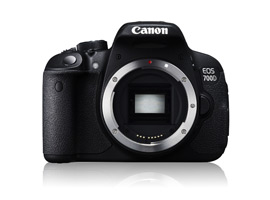
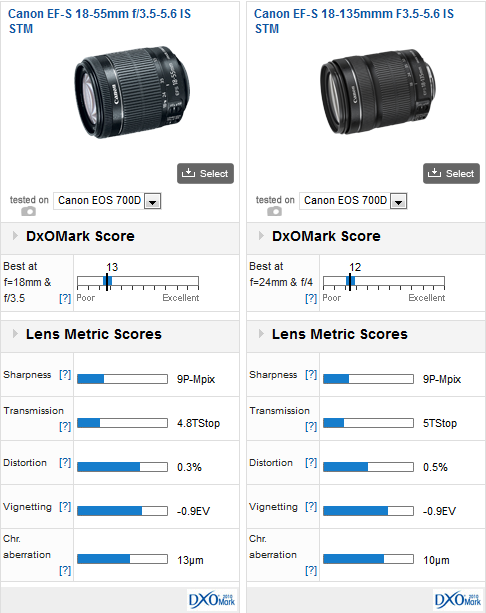
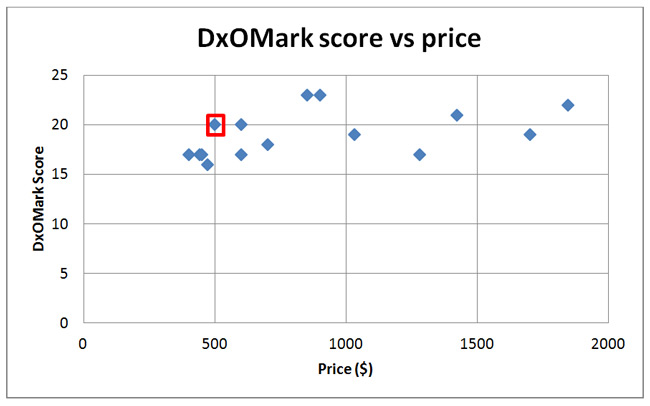
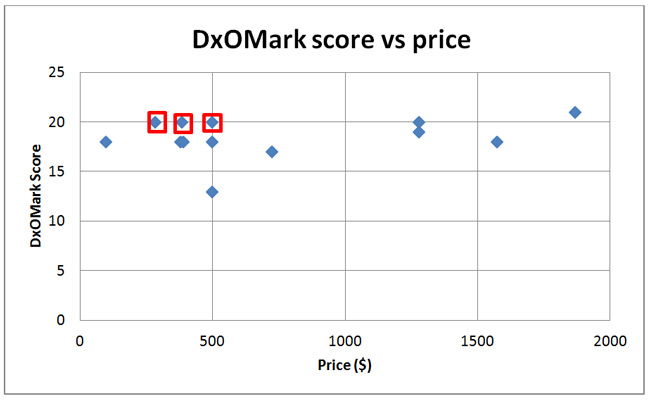
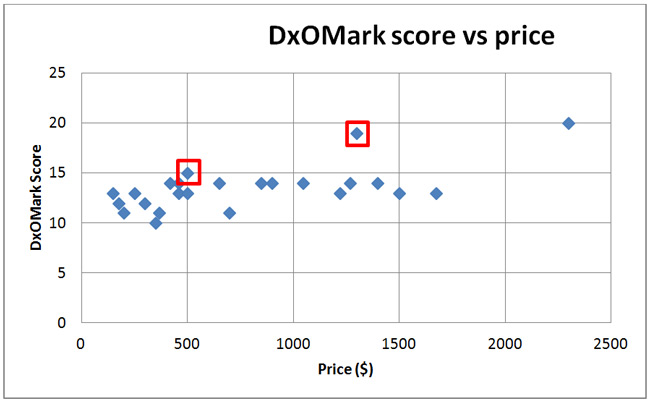
DXOMARK encourages its readers to share comments on the articles. To read or post comments, Disqus cookies are required. Change your Cookies Preferences and read more about our Comment Policy.